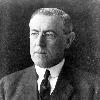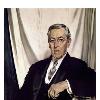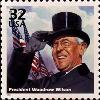

clean up Topics: Politics Tags: Woodrow Wilson View |
Tags: Woodrow Wilson View |
Tags: Woodrow Wilson View |
|||||||||
Thomas Woodrow Wilson (December 28, 1856 – February 3, 1924) was the 28th (List of Presidents of the United States) President of the United States. A leading intellectual of the Progressive Era, he served as President (President of Princeton University) of Princeton University from 1902 to 1910, and then as the Governor of New Jersey from 1911 to 1913. With Theodore Roosevelt and William Howard Taft dividing the Republican Party (History of the United States Republican Party) vote, Wilson was elected (United States presidential election, 1912) President as a Democrat (History of the United States Democratic Party) in 1912.
In his first term, Wilson persuaded a Democratic Congress (United States Congress) to pass the Federal Reserve Act, Federal Trade Commission, the Clayton Antitrust Act, the Federal Farm Loan Act and Americas first-ever federal progressive income tax (Income Tax in the United States) in the Revenue Act of 1913. Wilson brought many white Southerners into his administration, and tolerated their expansion of segregation (Racial segregation) in many federal agencies.cite journalurl=title=Woodrow Wilson and Federal Segregation first=Kathleen L. last=Wolgemuth journal=The Journal of Negro History volume=44 issue=2 date=April 1, 1959pages=158-173 publisher=Association for the Study of African-American Life and History, Inc.doi=10.2307/2716036issn=00222992
Narrowly re-elected (United States presidential election, 1916) in 1916, Wilsons second term centered on World War I. He based his re-election campaign around the slogan "he kept us out of the war", but U.S. neutrality was challenged in early 1917 when the German government proposed (Zimmermann Telegram) to Mexico a military alliance in a war against the U.S., and began unrestricted submarine warfare, sinking without warning every American merchant ship its submarines could find. Wilson in April 1917 asked Congress to declare war (Declaration of war).
He focused on diplomacy and financial considerations, leaving the waging of the war primarily in the hands of the Army. On the home front in 1917, he began the United States first draft (Military draft) since the US civil war, raised billions in war funding through Liberty Bonds, set up the War Industries Board, promoted labor union growth, supervised agriculture and food production through the Lever Act (Food and Fuel Control Act), took over control of the railroads, enacted the first federal drug prohibition (Harrison Narcotics Tax Act), and suppressed anti-war movements. National womens suffrage was also achieved under Wilsons presidency.
In the late stages of the war, Wilson took personal control of negotiations with Germany, including the armistice (Armistice with Germany (Compi�gne)). He issued his Fourteen Points, his view of a post-war world that could avoid another terrible conflict. He went to Paris in 1919 to create the League of Nations and shape the Treaty of Versailles, with special attention on creating new nations out of defunct empires. Largely for his efforts to form the League, he was awarded the Nobel Peace Prize. In 1919, during the bitter fight with the Republican-controlled Senate (U.S. Senate) over the U.S. joining the League of Nations, Wilson collapsed with a debilitating stroke. He refused to compromise, effectively destroying any chance for ratification. The League of Nations was established anyway, but the United States never joined. A Presbyterian of deep religious faith, he appealed to a gospel of service and infused a profound sense of moralism into Wilsonianism. Wilsons idealistic internationalism (Internationalism (politics)), now referred to as "Wilsonianism", which calls for the United States to enter the world arena to fight for democracy, has been a contentious position in American foreign policy (Foreign policy in the United States), serving as a model for "idealists" to emulate and "realists" to reject ever since.
Date of birth: 1856-12-28
Birth Location: Staunton, Virginia
Birth Name: Thomas Woodrow Wilson
Date of death: 1924-02-03
Death Location: Washington, D.C.
Spouse: Ellen Axson Wilson,Edith Bolling Galt Wilson
Children: Margaret Woodrow Wilson,Jessie Woodrow Wilson Sayre,Eleanor R. Wilson
Alma Mater: Princeton University (B.A) Johns Hopkins University (PhD (doctorate of philosophy))
Profession: Academic (Academia) (History, Political science)
Party: Democratic (Democratic Party (United States))
Religion: Presbyterianism
President of the United States
28th (List of Presidents of the United States)
In office: March 4, 1913term_end=March 4, 1921
Predceded by: William Howard Taft
Succeeded by: Warren G. Harding
Vice President: Thomas R. Marshall
Governor of New Jersey
34th (List of Governors of New Jersey)
In office: January 17, 1911-March 1, 1913
Predceded by: John Franklin Fort
Succeeded by: James Fairman Fielder
13th President of Princeton University
In office: 1902-1910
Predceded by: Francis L. Patton
Succeeded by: John Aikman Stewart



